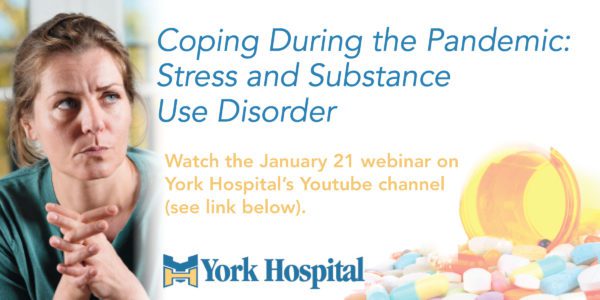“Alcohol sales, nationally are up 262% in 2020, compared to the previous year,” shared York Hospital Recovery Center Director Eric Haram, LADC, citing data from a 2020 study during a webinar on Thursday, Jan. 21 entitled “Coping During the Pandemic: Stress and Substance Use.” According to Haram, a licensed alcohol and drug counselor, “Increased consumption is a sign of the compounding impact of social distancing on stress and feelings of isolation, financial strain and family stressors brought on by the pandemic. Missing friends, loneliness, virtual school, remote work, living on top of each other for months during the quarantine have all exacerbated stress in our lives and our homes.”
 Haram continued, “Let’s face it, we’ve all been through a lot this year, and nobody has been immune to socioeconomic fall-out from COVID-19. But some populations are at more risk of substance misuse than others: people with existing mental health or substance use conditions, older adults, people exposed to gender-based sexual violence, and children and adolescents experiencing disrupted schedules, activities and socialization. We need to look out for each other now more than ever and be familiar with warning signs of substance misuse and dependence.” Some warning signs include health complications resulting from substance use, inability to carry out daily responsibilities, physical dependence and withdrawal symptoms, and feelings of preoccupation and craving.
Haram continued, “Let’s face it, we’ve all been through a lot this year, and nobody has been immune to socioeconomic fall-out from COVID-19. But some populations are at more risk of substance misuse than others: people with existing mental health or substance use conditions, older adults, people exposed to gender-based sexual violence, and children and adolescents experiencing disrupted schedules, activities and socialization. We need to look out for each other now more than ever and be familiar with warning signs of substance misuse and dependence.” Some warning signs include health complications resulting from substance use, inability to carry out daily responsibilities, physical dependence and withdrawal symptoms, and feelings of preoccupation and craving.
Dr. Christine Munroe, a York Hospital primary care provider and the medication-assisted treatment (MAT) medical director for the Recovery Center, added that there are many opportunities to get help if you or a loved one are concerned about substance misuse. “Come in and see us or call and talk to us. We’re here to listen and help determine your course of care. As primary care clinicians we care about you as a whole person and can advise how best to achieve health and wellness both physically and mentally,” she said.
Dr. Munroe echoed Eric Haram’s sentiments that many have experienced a great deal of stress as a result of the pandemic and have sought solace in alcohol or drugs. “Some people say they smoke a cigarette or have a glass of wine before bed to help them sleep,” said Dr. Munroe. “The truth is, alcohol, nicotine and caffeine can all interfere with getting a good night of sleep, and my number one recommendation for healthier ways to deal with stress is practicing good sleep hygiene.”
Establishing and sticking to a regular sleep schedule, limiting exposure to light and screens, creating a comfortable, cool, dark sleep environment, and avoiding alcohol, nicotine and caffeine before bedtime all help to alleviate stress. Dr. Munroe also shared healthy tips to help your body and mind deal with significant stressors, such as maintaining a healthy diet, exercising daily, connecting with nature, logging out of work to engage in other activities, practicing mindfulness, creating a gratitude journal, and being sure to reach out to friends to maintain a social network. “During the pandemic, don’t forget about your routine care,” Dr. Munroe added. “And if you need more help or more education about substance misuse, contact your primary care provider or the York Hospital Recovery Center at (207) 351-2118 to discuss options, including referral to treatment,” she said.
For people already in treatment for substance use disorders during the current COVID-19 pandemic, recovery coach and social worker Susie McKenna reviewed warning signs of a potential relapse and discussed available virtual recovery groups and related resources. These resources can be found on the York Hospital website at http://ow.ly/HsT650Dg2N2.
A full recording of the webinar can be found here.
For additional information, contact York Hospital Community Relations at (207) 351-2385 or [email protected].

